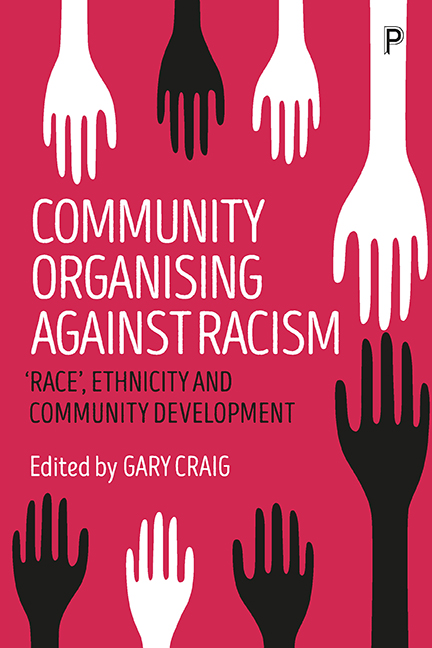Book contents
- Frontmatter
- Dedication
- Contents
- List of figures
- Author biographies
- List of abbreviations
- Introduction
- Section One Community development with ethnic minorities: history, theory, policy
- Section Two Building capacity with BME groups
- Section Three Working with Roma communities
- Section Four Global experience
- Section Five Working across cultural boundaries: ideological and personal reflections
- Afterword: Messages for community development in working with minority groups
- Index
Eighteen - Developing communities: do minority groups need development?
Published online by Cambridge University Press: 12 April 2022
- Frontmatter
- Dedication
- Contents
- List of figures
- Author biographies
- List of abbreviations
- Introduction
- Section One Community development with ethnic minorities: history, theory, policy
- Section Two Building capacity with BME groups
- Section Three Working with Roma communities
- Section Four Global experience
- Section Five Working across cultural boundaries: ideological and personal reflections
- Afterword: Messages for community development in working with minority groups
- Index
Summary
Preamble
This chapter is premised on my involvement with developing practice in South East Asian countries (Belton, 2012a, 2012b) and with Roma communities in London; however, I will also be drawing on understanding and shared practice with regard to on-going research work underway in Germany, Spain, Romania, Malta, Holland and Turkey. I critique the notion of community development in South East Asia (and elsewhere) by looking at responses to Roma groups in the European context, the challenges of professional ascription of community and ambitions to fabricate community. I explore assumptions about shared identity/interest and replication of colonial ethos, drawing on Fanonian perspectives. I consider work premised on suppositions about the need for development, how logically (and effectively if not consciously) these promote ‘deficit’ models of practice, implying that groups are relatively ‘underdeveloped’. This suggests an Illichian analysis of community development as a form of professional iatrogenesis1 that promotes incarnations of ‘weak power’ (Belton, 2013).
Introduction
What follows reflects attempts to move away from ideas of educational and community development with a number of government agencies in South East Asia, including Malaysia, Bangladesh and Sri Lanka, over the last few years, previously in Hong Kong and Shanghai. This more recent work aimed to develop innovative and progressive responses to particular social and political contexts, rather than to continue what is essentially a colonial conceptual framework premised on the supposed deficit inherent in those national contexts. This chapter also draws on a decade of working within an academic framework of community learning and development in the British and European context, effectively encompassing much the same deficit assumptions; in that sense, ‘colonialism has come home’.
Looking to exemplify this situation (to develop a heuristic model), I present a critical analysis of the current perspectives of Roma, the political position of this group and the threats concomitant with the same, given the ‘rise of the right’ in Europe, demonstrating how political and professional responses to Roma directly impact on them. The ‘colonial position’ of this population is exacerbated by anti-‘Roma’ racism. This constitutes a multifaceted set of phenomena, altering over time, place and, arguably, sometimes from person to person.
- Type
- Chapter
- Information
- Community Organising against Racism'Race', Ethnicity and Community Development, pp. 293 - 310Publisher: Bristol University PressPrint publication year: 2017



